- Home
- Rebecca Hagan Lee
Talk of the Ton Page 6
Talk of the Ton Read online
Page 6
She stopped that thought and steadied her voice. “I do believe that we are in agreement that you owe me a favor, monsieur.”
He looked at her hard for a moment. The smile curling his lips made her squirm in her seat. Then he suddenly thrust open the trap in the roof and shouted something up at his coachman. Emma couldn’t hear it.
“What did you say?” she demanded.
“I’m going to fulfill my favor,” he said, settling back in the corner and crossing his arms over his chest. He couldn’t have made it any plainer that dalliance was no longer on his mind.
Emma narrowed her eyes. She had a most uncomfortable warmth between her legs, and a squirming feeling all over her body, and her heart was still pounding.
“Since I cannot, alas, fulfill your first request,” he said, as politely as if he were unable to serve her a cup of hot tea, “I shall do my best to make your brief stay here in England a pleasant one. I shall show you a place that will be of great interest to you.”
The only place of interest that occurred to Emma was his house—nay, his bedchamber—but that seemed unlikely to be their destination.
She settled back into her corner. But she wasn’t going to wrap her arms over her chest and allow him to bask in his morality. Oh no. She may be a beginner at this seduction business, but she had a feeling that she was a natural learner. So she leaned her head back, as if she were exhausted, closed her eyes, and thought about the way he kissed her, and the way his hand had settled on her breast.
A little breathy sound came from her lips. She threw an arm over her head and grabbed the curtain, as if to steady herself when the carriage swayed. The bodice on her dress strained to drop below her nipple. The sensation was unbearably exciting and made her shift in her seat. She didn’t open her eyes. Either he was looking at her, or he wasn’t.
Instead, she concentrated on remembering his kiss. He had run his tongue right into her mouth. If she hadn’t heard gossip about such things, she never would have believed it. Of course, she knew about the mating act. But she’d never . . . really . . . in fact, it was rather the same, wasn’t it? When Gil’s tongue ran along her lips, she opened them as if he was the sweetest piece of sugar candy she’d ever been offered. And he tasted so good, the kind of good that made her heart thud against her ribs even to think of it. She squirmed a little in her seat. Because if kissing was like the act of consummating a marriage . . . The very thought made her feel strange.
She was tired of holding on to the curtain, so she dropped her arm and sat up, running her hands through her hair. It was lovely to have her hair swirling around her shoulders. Normally, her maid pinned it on top of her head with so many pins that she found them strewn all over the studio. It felt better this way, like silk rushing past her fingers. If—if she and Gil were ever—she made that breathy little sound again before she could even finish the thought about where he might like to feel her hair.
She was so curious that she had to look. So she popped open her eyes.
Gil was still leaning back in the corner of the carriage. But he didn’t look so all-fired moralistic and pleased with his smug little self now. No.
I knew I was a natural at this, Emma thought to herself.
She let a smile curl on her mouth that said. I know exactly what you wish you were doing to me, you monk, and then said aloud, “Do tell me where we’re going, Lord Kerr. I find it utterly distracting not to know my destination.”
“I expect you do,” he growled, but then, to her disappointment, he leaned back and closed his eyes. “Since you’ve had a nice nap, though, I must beg your indulgence while I do the same.”
Emma grinned at his supposedly slumbering face. He was a worthy opponent, this fiancé of hers. He just didn’t yet understand that she never gave up.
She tied her mask back on while he pretended to sleep. She was feeling optimistic again.
When one’s opponent doesn’t understand the importance of a contest, it’s mere kindness to allow him time to rethink his strategy.
Chapter Eleven
Two minutes later the carriage swayed to a halt, and a footman opened the door.
“Where are we?” she asked, taking Gil’s hand as she stepped down, and allowing him to wrap her in her pelisse once more.
“In the alley behind Hyde Park Theatre,” he said.
“Oh! Are they having a performance tonight?”
“Not tonight. But—” He was knocking on the door with his walking stick. “I expect we can enter, and . . . hello, Jeremy!”
A sturdy man with a walnut-colored head and small round eyes opened the door and peered out. “Who’s that? Oh, me lordship.” He pulled open the door and stepped back. “Would you like to look around, then?” He showed no curiosity; perhaps Gil took women to the darkened theater on a regular basis. “You’d better take my lantern; I’m having a bit of a sleep, and the dark won’t injure me none.”
Gil took the lantern in one hand and held his other out for Emma. She allowed him to draw her past Jeremy’s strong smell of onions, and up a narrow flight of stairs. Behind them, Jeremy flopped into a seat in the stairwell, leaned back against the wall, and lapsed instantly back into snores.
“Do you come here often?” she asked.
“All the time,” he said. “I am a shareholder in the theater. We are just preparing for the opening of A Midsummer Night’s Dream. I thought you might like to see the sets. They’re up already.”
“Oh, I should, yes,” Emma said.
The familiar smell of dust and greasepaint greeted them as Gil opened the door at the top of the stairs. At the far end of a narrow corridor, a curtain lifted slightly, disturbed by their arrival. A moment later, Gil held aside that curtain, and they emerged onto stage left.
“Just a moment,” he said. He walked over to the wall. For a second she saw a flare from a burning twist of paper, and a moment later light broke like the striking of day-break itself.
“Oh!” Emma cried, startled. “Gaslight in the theater! I’ve never heard of such a thing.”
“We’ve had it for only a few months,” Gil said. “Does that theater of yours use rollers for your drop scenes?” he enquired.
“Of course!” she said. “The rollers are much better than the flats. Before Mr. Tey installed them, I had to cut my scenes in half, which I loathed. You could always see the line down the middle.”
“This is a drop scene, of course,” Gil said, gesturing at the canvas already in place at stage back. “A man called Samuel Grieve painted this set of the woods in A Midsummer Night’s Dream.”
The flat depicted a dreamy, dusky forest, tall trees reaching upwards and a few leaning comfortably to one side or the other. The ground was covered with small purple flowers.
“It’s lovely,” Emma said, walking over to examine it. Mr. Grieve had painted the flowers out of proportion so that they would look like a hazy, blended mass to the audience.
“I’ll bet your theater isn’t using this yet,” Gil said.
He walked across the stage and lit a small lamp, and then pulled forth a rigid side flat. It glided forward smoothly, presumably on a groove set in the wooden floor. It seemed to be nothing more than a large wooden frame, across which was stretched an expanse of colored silk, albeit in a lovely shade of rosy pink.
“What does one do with that?” Emma asked.
“It pivots,” Gil expained. “See?”
He gave it a little push. The piece pivoted smoothly, and suddenly she saw that looking at the woodland scene through the colored silk was entirely a different experience. The light fell on the silk first, which threw a rosy glow on the woods, picking out small flecks of gold leaf paint embedded amongst the leaves.
“Oh, Gil, how lovely!”
He grinned at her, standing in the middle of the stage with his hands on his hips.
“Is this how you got those calluses on your hands?” she asked.
“What?”
“Working with the sets?”
�
��No. Painting sets is not gentleman’s work, and I find it surprising that you are allowed to paint sets. Of course, you are a widow, but even so, theater folk are notoriously immoral. Do you not worry about your reputation?”
“I paint sets and scenery in the privacy of my own home, and my participation is known only by a few,” Emma said. “But I regret your rather provincial ideas of actors and actresses.”
Gil walked idly across the stage and stood between the pink transparency and the woodland scene. “You see?” he said. “The fairies will dance and play behind the transparencies.”
Emma blinked. Through the pink silk, the muscled frame of her fiancé suddenly looked mysterious and seductive, winsome as a fairy king.
“Are you Oberon, then?” she asked, laughing.
“I could be,” he said. “I wasn’t wearing a costume at the masquerade.” He reached down and snatched a wreath of flowers from a bench. “I do believe this is Titania’s wreath—tsk, tsk, left about onstage—but ’twill do.” He struck a pose. “Tarry, rash wanton: am not I thy lord?”
Emma felt a wicked, Queen Titania smile curl her lips. She tossed her hair back and walked a turn, letting her hips take on a seductive lilt. “Then must I be your lady,” she said, throwing Gil a glance over her shoulder. She could feel her jeweled mask glittering on her face, turning her into a fairy queen indeed. She took a turn or two just so he could enjoy the swaying of her hips, shaking her hair free so that it floated in the air, the way a queen of the fairies would wear it. The back flat’s gold flecks of paint glittered in the corner of her vision, as if a small tribe of fairy servants sparkled in the trees, awaiting her every command.
She glanced over at her Oberon. He seemed to be enjoying her bosom.
“You should accuse me of adultery next,” he said huskily. “Titania accuses Oberon of having a mistress, a warrior love.”
Emma shook her head. “That must be anther Titania. My husband will never have a mistress.”
He began to walk toward her, all slow and easy but with purpose. Pure exuberation raced up and down her limbs.
“And just how do you intend to stop Oberon from his seductive habits?”
But Emma had just realized that there were more side flats, stretched with different silks, waiting to emerge. She pulled at one, and it slid smoothly along its groove onto the stage. Gil’s large arm reached over her head and pulled the flat all the way, then spun it on its pivot so that gold silk cast its radiance on the fairy forest. The gold flecks looked closer now, dancing free of the trees.
“It fools the eye,” Emma said, awed. “They look like fairy lights.”
Her Oberon knew his Shakespeare. “Didn’t thou not lead Theseus through the glimmering night,” he asked, bending his head and brushing his lips across hers, “from Perigenia, whom he ravished?”
Ravished. Emma suddenly discovered she loved that word. She let her neck fall back as he kissed her. His mouth came to her cheek and her chin, leaving small fiery trails in his wake. Her mind fogged, and her arms wound around his neck, when suddenly she remembered her next line:
“These are the forgeries of jealousy!” she said, breaking free and dancing across the stage in a swirl of skirts. She glanced back over her shoulder and gave him the smoldering glance of a fairy queen bent on scolding her mate. On scolding and ravishing her mate.
He laughed. “You don’t seem to know your Shakespeare as well as one might hope from a well-brought-up young lady. That line does not follow.”
“Ah, but I’m not a lady,” she pointed out, feeling that they had already covered that ground. Just to prove it, she kicked off one of her silk slippers. It curved into the air, a jewel flashing as it went, and disappeared onto stage left.
“I suppose I can carry you back to the carriage,” Gil said with mock despair.
Emma kicked her other shoe into the air. This one thumped against one of the sets and set it trembling.
Then she danced behind the rosy transparent silk. “Are these easy to turn?” she asked.
“Of course,” he said. “The boys who play the fairies love to make them twirl.”
“I see why,” Emma said, awed by the cleverness of it. For with a pull of her fingers, the stretched silk whirled on its pivot, and rosy gleams danced around the room, flashing over Gil’s dark hair, on his lean cheeks and high cheek-bones, on that wickedly seductive lower lip of his.
He swept the hair out of his eyes as she watched.
“You’re quite beautiful,” she said, startled to hear the huskiness of her own voice.
“Do you say that as a queen, or as Emelie?” he asked, smiling.
“A woman would walk a mile for a touch of that nether lip,” she said dreamily.
“Tsk, tsk,” he said, and there was laughter in his voice. “You’re mixing your plays. Othello, and in such a sad context.”
“Titania would never travel even a yard for the touch of a man’s lip,” she said, pushing the pink silk flat sideways so that it turned just enough to make a barrier between the two of them.
“Perhaps not,” he said, amused, and then she saw the words die in his mouth. For she had pulled up her hand brocaded skirt and was holding one leg out as she slowly, slowly unrolled her silk stocking. It was a lovely stocking, of the softest gossamer silk.
He made a strangled growl in his throat. She pulled off the stocking, pointed her toes, and took a moment to admire her leg. She had always thought that her legs were most attractive.
Emma peeked at Gil. Clearly, he thought so, too. She gave him a secret little smile.
“Emelie!” he said, “Stop what you are doing. This is nonsense.”
In answer, she reached under all her petticoats and slipped her second stocking from its garter. A moment later, that stocking slipped past a slender, pointed toe, and she tossed it over her shoulder.
“I insist that you do not disrobe yourself on the stage,” he said, but Emma ignored him. It was good for a man to know straight off that there were times when he might—might—be obeyed, and there were others when he should understand his place.
“I shan’t,” she said, casting him a sparkling, mischievous glance. “I’m overheated.”
“Overheated!”
It was the work of a moment to unlace her tight bodice and push it off her shoulders, slipping her wide sleeves down her arms. He made another sound, like a beast in the darkness, when her bodice fell to the ground. Of course, she shouldn’t be the one to say so, but her breasts looked rather magnificent. Her little corset was the kind that aimed to levitate, rather than confine, and she had neglected to wear pantalettes. . . . It was a delicious and strange experience.
She shook her hair free again; it swirled around her shoulders with a touch like fire. A slow blaze eddied in her belly. “Lord Kerr,” she called, “I cannot remove my skirts without some help. This gown is constructed in two parts, as you can see.”
She looked up, and Gil was leaning against the pink silk screen, laughing silently. She blinked at him. He wasn’t supposed to be laughing at her. He was supposed to be transfixed with lust, driven to the extremities of his self-control, turned to a satyr. Or something akin to it.
“Have I told you that I begin to feel more and more sympathy for that worthy burgher, your future husband?” he asked.
Emma started trying to pull her skirts around to the front so that she could undo all those little buttons herself. Since Gil wasn’t inebriated—and apparently he would never be inebriated again—she was going to have to rely on large expanses of naked female flesh to drive him into a more amenable frame of mind.
Just as she began to unfasten the tiny buttons that held up her skirts, Gil apparently figured out her intent.
There was a distinct note of warning in his voice now. “I must ask you again. Please do not disrobe yourself on the stage of the Hyde Park Theatre.”
“Why not?” she asked. “Naturally I had hoped we would be at Grillon’s. I am partial to starched sheets, but a woman must b
e prepared for unexpected pleasures when they occur.”
There was something about the set of his jaw that made her think that possibly the village women had underestimated the strength of will of an earl when they talked of naked women. But she’d gone too far to stop now. She unfastened the last button, and the heavy, bejeweled skirts fell to the ground with a swish, taking her petticoats with them.
Now she was wearing nothing more than her little boned corset, the clever bit of undergarment that pressed her stomach in while pushing her breasts up. She raised her head slowly to look at him, feeling her hair slide down her naked back.
His eyes were black, half lidded, his jaw still set. He leaned there as if she were a circus exhibit that he’d happened upon, a naked woman on the stage, yet another Frenchwoman amongst the hundreds. It wasn’t going to work. She should reach right down and pick up those heavy skirts and pull them on so that she didn’t have to meet his uninterested eyes again. This was profoundly embarrassing. This was beyond humiliation.
But she was a woman with Tudor bloodlines in her, and a fierce enough character that she’d never allowed herself to feel dismal over the neglect of her betrothed. She was Emma. She painted stage sets. She had exquisite clothing. She could pick up one of those besotted, fish-lipped boys back at the masquerade and marry him in about twelve minutes, whether she had twenty-four years or thirty-four years.
The tightness in her chest eased a little. After all, the theater was warm, and the light of the gas lamps was flattering. She was a naked Queen Titania, that was all.
Still, disappointment was biting in her heart, welling up with resentment. Perhaps he was eunuched. Perhaps those six months in Paris had worn the man out.
She looked back at Gil again. His eyes were scowling, and his jaw set so tightly that he looked like a night watch-man waiting for a thief to descend a ladder. But—but—
“Damn it all,” he growled, and his voice was black with . . . rage? Resentment? Something else?
She gave him a smile. It wasn’t one of her full-lipped, passionate, I’m-a-Frenchwoman smiles. It was a smile with a bit of joy in it, an invitation, a secret, a laugh.

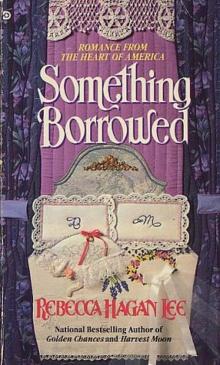 Something Borrowed
Something Borrowed Talk of the Ton
Talk of the Ton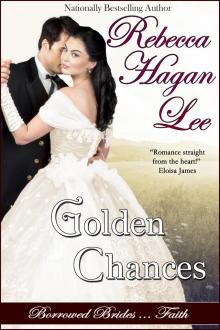 Golden Chances
Golden Chances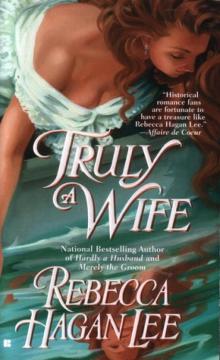 Truly a Wife
Truly a Wife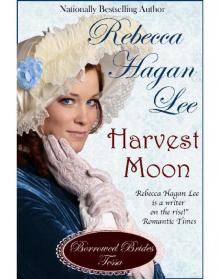 Harvest Moon
Harvest Moon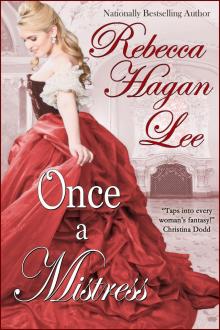 Once a Mistress
Once a Mistress Gossamer
Gossamer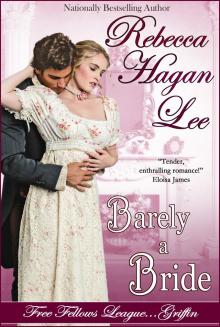 Barely a Bride
Barely a Bride Hardly a Husband
Hardly a Husband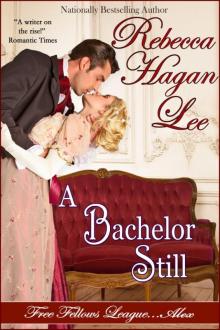 A Bachelor Still
A Bachelor Still A Wanted Man
A Wanted Man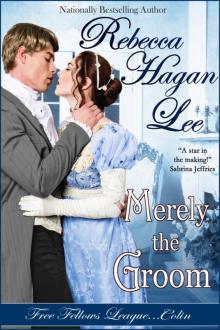 Merely the Groom
Merely the Groom Whisper Always
Whisper Always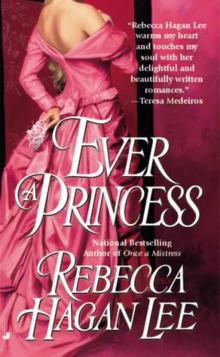 Ever a Princess
Ever a Princess A Hint of Heather
A Hint of Heather